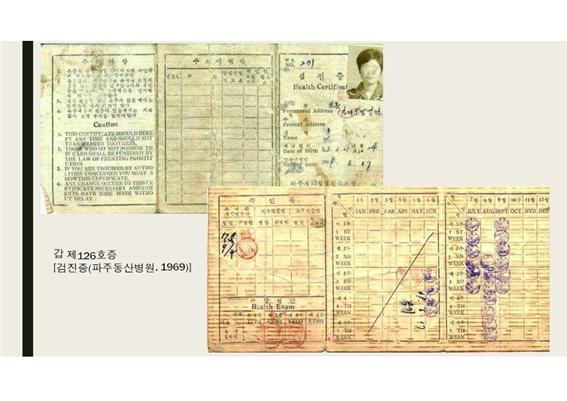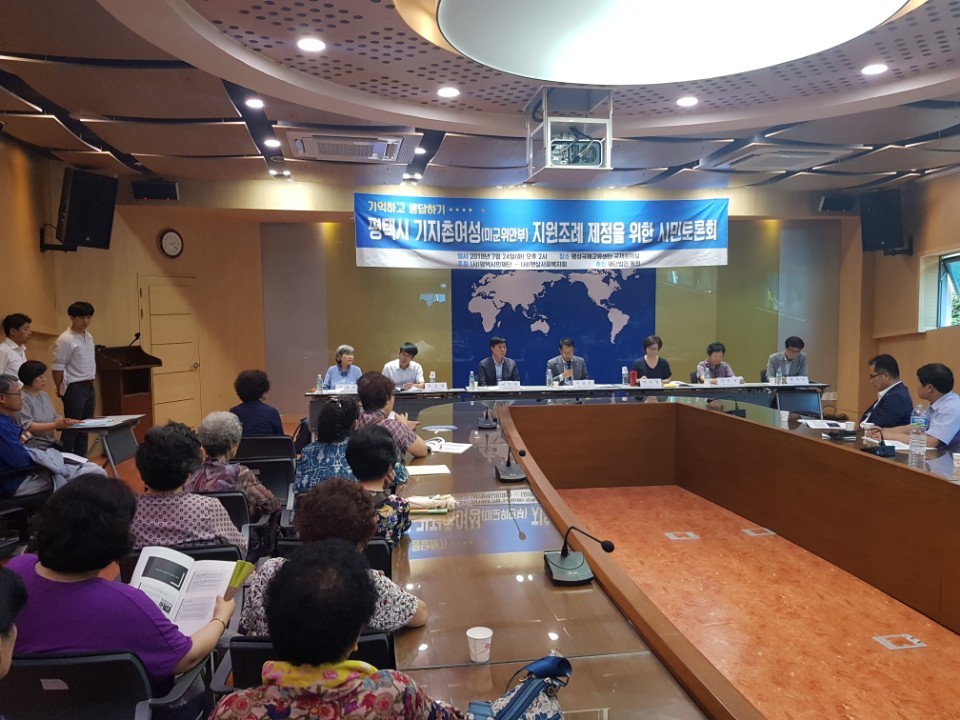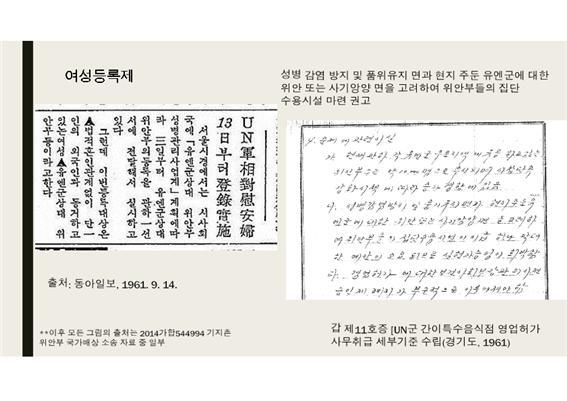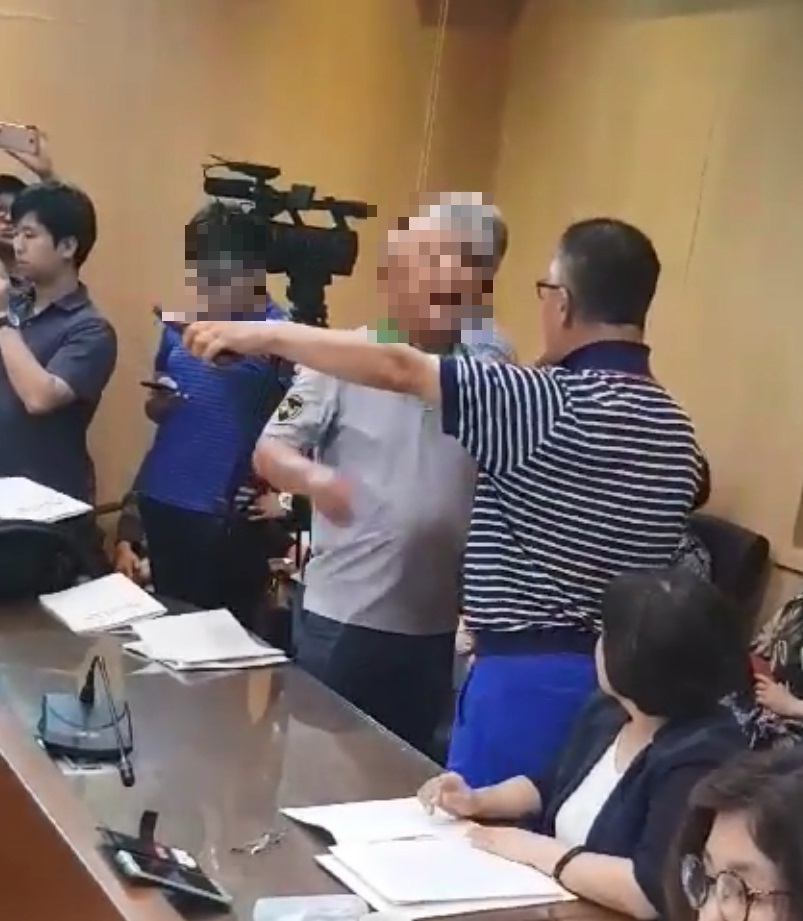Posted on : Aug.5,2018 19:39 KST
Modified on : Aug.5,2018 19:44 KST
 |
|
A government-issued certificate of cleanliness (from sexual diseases) provided to former camp town women. (provided by Lee Na-young, Chung-Ang University professor)
|
“US comfort women” were encouraged by South Korean government to engage in prostitution
“These women helped their country and earned foreign currency. It’s okay to accept help.”
After leaving her hometown at age 19, “Mrs. Kim” handled general affairs duties for women at a US military camp town in Anjeong, a village in the township of Paengseong in Pyeongtaek, Gyeonggi Province. Now 73, she recalls the remarks that government employees used to say at the time when providing support to the women in the form of rice and daily essentials.
Other women recalled that the government employees would provide detailed instructions to the camp town women on matters up to and including how to behave when engaging in prostitution. A police station chief even threatened them with charges of “aiding the enemy” if they displeased the US soldiers. After the era of efforts to earn foreign currency from US troops ended, Kim and the camp town women found themselves shunned by their family members. Today she lives alone, struggling to make ends meet. Around 120 former camp town women continue living today in the US military camp town area in Pyeongtaek.
 |
|
A citizens’ forum at the Paengseong International Exchange Center in Pyeongtaek on the topic of enacting an ordinance for support to the city’s “US military comfort women” on July 24. (provided by the Pyongtaek citizens’ forum)
|
Citizens’ forum to protect women financially and socially
On July 24, a citizens’ forum was held at the Paengseong International Exchange Center in Pyeongtaek on the topic of enacting an ordinance for support to the city’s “US military comfort women.” The “US military comfort women support ordinance” currently being pursued by the Gyeonggi Provincial Assembly and civic groups to support the now-elderly camp town women is running into objections from residents and merchants operating in the area around the US base.
In March, Democratic Party assembly member Park Lee Ok-bun submitted an ordinance on “support to US military comfort women in Gyeonggi Province” with the signatures of around 20 fellow members of the assembly. But the ordinance draft failed to move forward amid the province’s objections that there was “no higher law” to serve as a basis for the ordinance.
The Pyeongtaek ordinance draft stresses the need for the local government to take action in helping to rehabilitate the reputations of the camp town women and support their residential and financial stability. Now in their seventies and eighties, many of the women are cut off from their families and have faced discrimination and ostracism from the local community.
The Gyeonggi ordinance draft clearly states that the comfort women issue is “the state’s responsibility,” noting that the state “encouraged, abetted, and condoned prostitution for the stationing of US Forces Korea, with the result that the camp town women were forced to endure forcible health examinations, incarceration, beatings, and human trafficking.” A recent court ruling presented an argument along similar lines.
Like the appellate court before it in February, Seoul High Court ruled that the state should acknowledge responsibility and pay compensation to the women, recognizing that there had been “acts of justification and encouragement of prostitution as well as unlawful forced segregation and internment during the state’s process of operating camp towns.”
 |
|
An article written about the South Korean government’s regulations for former camp town women regarding the provision of sexual services to UN forces. (provided by Lee Na-young, Chung-Ang University professor)
|
Objections from local communities
But objections have been fierce. Residents and merchants in Anjeong, which is the site of the US Eighth Army command, insisted that while they are not opposed to helping the camp town women as “neighbors in need,” they are not willing to accept the ordinance’s use of the term “US military comfort women.” Speaking during the July 24 forum, some vehemently objected that the term “comfort women” refers specifically to women mobilized as sexual slaves to the Japanese military and questioned why it was being used to refer to women who provided sexual services to US troops.
“While South Korean women were living off of naps and making money at places like wig factories, these women were putting televisions in their homes and hiring personal housekeepers with the money from sex work with US troops,” said an official with the Paengseong merchants’ association – suggesting that the “comfort women” name is inappropriate for voluntary sex workers because it implies coercion.
“If the women who provided services to US troops are ‘US military comfort women,’ does that make the sex workers who provide services South Korean troops ‘South Korean comfort women’?” the official asked, complaining of the “ulterior motive of stirring the pot between us and the US military.”
 |
|
A citizens’ forum at the Paengseong International Exchange Center in Pyeongtaek on the topic of enacting an ordinance for support to the city’s “US military comfort women” on July 24 was interrupted by voices of local opposition. (provided by the Pyongtaek citizens’ forum)
|
Merchants also expressed concerns about possible problems for business.
“Once these women are determined to be ‘US military comfort women,’ are US military personnel going to be able to visit the bars in front of the base anymore?” one wondered.
After the previous difficulties over use of the term “comfort women,” the human rights ordinance may be going ahead with a name change.
“In light of local merchants’ objections, we are discussing the matter of changing the name to ‘camp town women’s assistance ordinance,’” said Pyeongtaek Citizens’ Foundation chair Lee Eun-woo.
Chung-Ang University professor Lee Na-young, who has studied the issue of comfort women for the Japanese and US militaries and South Korean forces stationed in Vietnam, observed, “While it accurate to conclude that the US military comfort women were mobilized by the state and suffered human rights violations like the Japanese military comfort women, the important thing right now is to have this ordinance enacted, even if it takes a name change.”
By Hong Yong-duk, South Gyeonggi Province correspondent
Please direct comments or questions to [english@hani.co.kr]












